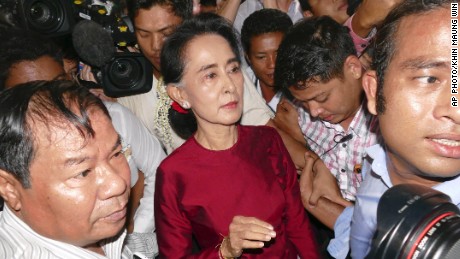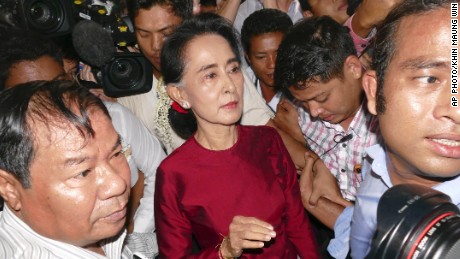Aung San Suu Kyi Fast Facts


Here is a look at the life of Aung San Suu Kyi, Burmese activist and Nobel Peace Prize winner.
Personal:
Birth date: June 19, 1945
Birth date: June 19, 1945
Birth place: Rangoon (Yangon), Burma (Myanmar)
Birth name: Aung San Suu Kyi
Father: Aung San, commander of the Burma Independence Army who helped negotiate Burma’s independence from Britain. He was assassinated on July 19, 1947.
Mother: Ma Khin Kyi, a diplomat and later an ambassador to India.
Marriage: Michael Aris (January 1, 1972-March 27, 1999, his death)
Children: Kim (Burmese name: Htein Lin), 1977; Alexander (Burmese name: Myint San Aung), 1973
Education: St. Hughes College, Oxford University, B.A. in philosophy, politics and economics, 1967
Other Facts:
Referred to as Daw Aung San Suu Kyi, where “Daw” is an honorific title.
Referred to as Daw Aung San Suu Kyi, where “Daw” is an honorific title.
Grew up in Myanmar and India, but moved to England in the 1960s.
Timeline:
1964 – Moves to England to study at Oxford University.
1964 – Moves to England to study at Oxford University.
1969-1971 – Works in the United Nations in New York as assistant secretary for the Advisory Committee on Administrative and Budgetary Questions.
1985-1986 – Is a visiting scholar at the Center for Southeast Asian Studies, Kyoto University, Japan.
1987 – Is a fellow at the Indian Institute of Advanced Studies in Simla, India.
April 1988 – Returns to Myanmar when her mother suffers a severe stroke.
August 15, 1988 – In an open letter to the military-controlled government, asks for multiparty elections.
August 26, 1988 – In her first public address, outside the Shwedagon Pagoda, calls for a multiparty democratic government.
September 24, 1988 – Co-founds the National League for Democracy (NLD), a party dedicated to nonviolence and civil disobedience, and is appointed general secretary.
July 20, 1989 – Is placed under house arrest for charges of trying to divide the military, charges she denies.
May 27, 1990 – Her party, the NLD, wins more than 80% of the legislative seats, but the State Law and Order Restoration Council (SLORC) does not recognize the election results.
July 10, 1991 – Wins the Sakharov human rights prize from the European Parliament.
October 14, 1991 – Wins the Nobel Peace Prize “for her non-violent struggle for democracy and human rights.”
July 10, 1995 – Is released from house arrest, but her political activity is restricted.
September 23, 2000 – Is again placed under house arrest.
December 6, 2000 – U.S. President Bill Clinton awards the Presidential Medal of Freedom to Aung San Suu Kyi in absentia.
May 6, 2002 – Is released from house arrest.
May 30, 2003 – While traveling in Myanmar, her motorcade is attacked by a pro-government mob, and she is held by the military and later placed under house arrest.
November 29, 2004 – Learns her house arrest has been extended for another year.
May 2006 – House arrest is extended for another year.
June 9, 2006 – Assistant Secretary of State for Public Affairs Sean McCormack tells reporters that Aung San Suu Kyi has been hospitalized for an undisclosed ailment.
May 25, 2007 – The government extends her house arrest for another year.
May 6, 2008 – U.S. President George W. Bush signs legislation awarding a Congressional Gold Medal in absentia to Suu Kyi.
May 27, 2008 – The government extends her house arrest for another year.
May 14, 2009 – Suu Kyi is arrested and charged with violating the terms of her house arrest. This is in response to an incident earlier in the month, when American John Yettaw swam uninvited to Suu Kyi’s lakeside house. If convicted she faces up to five years in prison.
May 18, 2009 – Suu Kyi’s trial on charges of government subversion begins.
August 11, 2009 – Suu Kyi is found guilty of violating the terms of her house arrest and sentenced to 18 more months of home confinement.
May 7, 2010 – The NLD refuses to register for the election, thereby disqualifying itself as a political party and officially dissolves.
May 10, 2010 – Meets with Assistant Secretary of State Kurt Campbell at her home.
November 13, 2010 – Suu Kyi is released from house arrest. She has spent 15 of the last 21 years under house arrest.
November 15, 2010 – Speaking to reporters at the headquarters of her National League for Democracy (NLD) pledges to keep working toward restoring democracy and improving human rights in Myanmar.
January 28, 2011 – Suu Kyi’s recorded message is played at the World Economic Forum in Switzerland, in which she stresses the need for Myanmar to re-establish ties with the rest of the world.
November 18, 2011 – Nyan Win, the spokesman for Suu Kyi’s National League for Democracy, says that Suu Kyi will participate in the next elections. Suu Kyi’s National League for Democracy announced earlier in the day that it planned to re-register as a political party and participate in all future parliamentary elections.
December 13, 2011 – The National League for Democracy is granted permission to register for future elections in Myanmar.
January 18, 2012 – Registers to run for a parliamentary seat.
April 1, 2012 – Wins a seat in parliament in Myanmar’s first multiparty elections since 1990.
May 2, 2012 – Along with 33 other newly elected members of her party, the National League for Democracy, takes the oath of office for Myanmar’s parliament, resolving an impasse over the oath’s wording that had been preventing her from taking her seat in the legislature.
May 29, 2012 – Makes history by stepping on foreign soil for the first time in more than two decades when she arrives in Bangkok, Thailand.
June 1, 2012 – Aung San Suu Kyi speaks at the World Economic Forum on East Asia.
June 16, 2012 – Delivers her acceptance speech for her 1991 Nobel Peace Prize, in Oslo, Norway.
June 21, 2012 – Addresses both houses of the British parliament.
September 19, 2012 – Aung San Suu Kyi accepts the Congressional Gold Medal in Washington, D.C. She later meets with President Barack Obama.
November 19, 2012 – Meets with President Barack Obama at the lakeside villa where she spent years under house arrest. Obama praises Suu Kyi for her courage and determination during his visit to Myanmar, the first visit by a sitting U.S. president.
March 10, 2013 – Wins re-election as opposition leader.
October 22, 2013 – Suu Kyi accepts the 1990 Sakharov Prize for Freedom of Thought in Strasbourg, France, originally awarded to her in 1991.
June 10-14, 2015 – During her first visit to China, meets with Chinese President Xi Jinping as she begins a trip that will emphasize her apparent transition from human rights defender to pragmatic politician.
November 13, 2015 – Myanmar’s election commission announces that Suu Kyi’s National League for Democracy (NLD) party has won a historic majority in the nation’s first freely held parliamentary elections. Suu Kyi is not able to become President because of a constitutional amendment that prohibits anyone with foreign relatives from becoming the nation’s leader.
April 5, 2016 – Suu Kyi is named State Counselor, a role created especially for her. The post allows her to be in contact with ministries, departments, organizations, associations and individuals, and makes her accountable to parliament, according to Myanmar’s state media. While Suu Kyu is barred from holding the office of president, the new position is widely expected to allow her to rule by proxy.
Read more: http://www.cnn.com/2013/01/18/world/asia/aung-san-suu-kyi-fast-facts/index.html